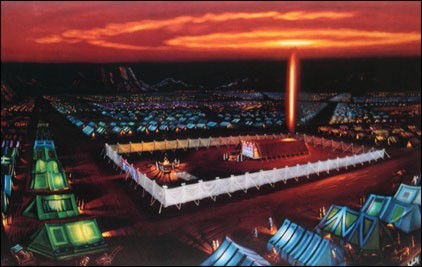
20/20 Vision for a Breakthrough
Perhaps you are in a situation where you are suffering (1) physically, emotionally, or spiritually and have been in this condition for months, years, or decades. Perhaps, you have prayed to the Lord, and He has given you His comfort and strength to endure, but you have not obtained victory over the situation.
Furthermore, you understand the principle that if you call upon God in prayer (1) or song in one of His many names, then He becomes that name to you (see the list below). For example, you call upon Jesus (1) (Jesus means God Saves), and He becomes your Savior (Romans 10:13). You call upon God as your Healer (Yahweh-Rapha)(3), and He becomes your healer, etc.
The name of the Lord is like a strong tower; the righteous person runs to it and is set safely on high. (Proverbs 18:10 NET)
Realize that God is all of His names independent of our declaring them; however, when we declare them from our spiritual heart by faith, they become a reality in our lives. Listed below are some of the names of God from the Bible. (3)(5)
Elohim – God is supreme! Infinite God who is under covenant with Himself to perform the conditions of that covenant (cf. Hebrews 6:13). From a root that means “to swear.” The name implies one in covenant and fullness of might. It refers to absolute, unqualified, unlimited energy. A plural name revealing God in the unity and trinity of all His divine personality and power. (11) (Genesis 1:1)
(New Covenant Equivalent(s): Hebrews 6:13)
Yahweh (YHWH) (6)- The Lord. The personal name of Israel’s covenant God in the Old Testament is often called the Tetragrammaton (based on the Greek for “four” (tetra) and “letter” (grammaton)). (8) Ancient writers did not assign vowels to the Tetragrammaton out of reverence. (9) It is claimed YHWH was pronounced only once a year, on the day of expiation (atonement), by the high priest, in the Holy of Holies. (10) (Exodus 6:3)
Yahweh Elohim – The LORD God Supreme. Denoting that Elohim, the God of relationship, now requires order and obedience. (11) (Genesis 2:4)
Adonai – My Lord, Master, and Owner. A name for God, which is translated as “Lord.” After the Babylonian Captivity, the Jews ceased to pronounce the Tetragrammaton YHWH or “Yahweh” orally, presumably out of their great reverence for that name, when they read aloud the Hebrew Bible. Instead, they used the circumlocution “Adonai.” (Genesis 15:2)(7)
(New Covenant Equivalent(s): Acts 7:5)
Jehovah – Certain translations of the Bible into English have employed the word “Jehovah” instead of rendering Yahweh as “the LORD.” About A.D. 1520 Christians, following the lead of the Vatican, began to join the consonants from YHWH with the vowels from Adonai to form the hybrid word YEHOWAH which in English is “Jehovah.” (8)
Yahweh-Jireh (Yir’eh) – The Lord My Provider (Genesis 22:14)
(New Covenant Equivalent(s): 1 Corinthians 10:13. 1 Timothy 6:17).
Yahweh-Rapha (Rof’ekha) – The Lord My Healer (Exodus 15:26. Psalm 30:2;103:3)
(New Covenant Equivalent(s): Matthew 4:24;8:1-3;8:16,17. Acts 10:38. 1 Peter 2:24).
Yahweh-Nissi – The Lord My Banner (Exodus 17:15. Isaiah 49:22. He brought me to the banqueting house, and his banner over me was love. Song of Solomon 2:4 ESV) (Song of Songs 2:4 NET)
(New Covenant Equivalent(s): John 13:35)
Yahweh-M’Kaddesh (M’kadishkhem) – The Lord Who Sets Me Apart (i.e., sanctifies me) (Leviticus 20:8. Exodus 31:13).
(New Covenant Equivalent(s): John 17:17-19. 1 Corinthians 6:11)
Yahweh-Shalom – The Lord My Peace (Judges 6:24)
(New Covenant Equivalent(s): Philippians 4:6-9. 1 Thessalonians 5:23)
Yahweh-Rohi (Ro’eh) – The Lord My Shepherd (Psalms 23:1. Genesis 48:15,16. Psalms 95:7)
(New Covenant Equivalent(s): John 10:11. Hebrews 13:20. Revelation 7:17)
Yahweh-Tsidkenu (Tsidqenu) – The Lord My Righteousness (Jeremiah 23:6;33:16)
(New Covenant Equivalent(s): Matthew 20:26-28. John 13:12-14. Philippians 2:6,7)
Yahweh-Shammah – The Lord is Present (Ezekiel 48:35)
(New Covenant Equivalent(s): Revelation 21:3)
Yahweh-Sabaoth (Tseva’oth) – The Creator, Divine Warrior and Divine King, Lord of the Holy Angelic Army, the commander of the cosmic forces, and the divine council’s head. (1 Samuel 1:3,11)
(New Covenant Equivalent(s): Romans 9:29. Revelation 11:16,17)
Yahweh-Mashach – The Lord who has anointed me. (Isaiah 61:1,2. Psalms 23:5)
(New Covenant Equivalent(s): 2 Corinthians 1:21,22. 1 John 2:20)
Yahweh-Uzzi – The Lord My Powerful Strength (Psalms 28:7)
(New Covenant Equivalent(s): Ephesians 6:10)
Yahweh–Magen – The Lord My Shield (Genesis 15:1. Psalms 3:3;7:10;18:35;33:20. Proverbs 2:7)
(New Covenant Equivalent(s): Ephesians 6:16;1-18)
Yahweh-Ezrati – The Lord My Helper (Psalms 33:20. Isaiah 41:13)
(New Covenant Equivalent(s): Hebrews 13:6)
Yahweh-Hoseenu – The Lord My Maker (Psalms 95:6)
(New Covenant Equivalent(s): Ephesians 2:22. Hebrews 11:10 )
Yahweh-Yahweh-El-Hanun– The Lord, the Lord, God of Compassion (Exodus 34:6,7. Joel 2:13. Jonah 4:2)
(New Covenant Equivalent(s): Matthew 9:36. Romans 2:4. James 5:11. 1 John 4:6)
Ruach-Yahweh – The Spirit of the Lord. (1 Samuel 16:13. Isaiah 11:2,3; Isaiah 40:13,14)
(New Covenant Equivalent(s): 2 Corinthians 3:17)
Ehyeh – God is unchanging, I Am (Exodus 3:14)
(New Covenant Equivalent(s): John 8:58)
El Shaddai – God Almighty; all-sufficient God, the name of God known to Abraham, Isaac, and Jacob Exodus 6:3 (Genesis 17:1;28:3;35:11;43:14;48:3. Exodus 6:3. Ezekiel 10:5. )
(New Covenant Equivalent(s): Revelation 19:15)
Shaddai (Shadday) – Almighty (Genesis 49:25. Numbers 24:4.,16. Job 8:3,5;11:7;13:3. Psalms 68:15;91:1; Isaiah 13:6; Joel 1:15)
El-Elohim-Yahweh – The Mighty One, God, The Lord (Psalms 50:1. Joshua 22:22. Joel 2:13. Jonah 4:2)
(New Covenant Equivalent(s): Matthew 9:36. Romans 2:4. James 5:11. 1 John 4:6)
Elyon – High, Highest, Most high. (Psalms 91:1.
Yahweh Elyon– The Lord Most High (Psalms 7:17)
El-Elyon – God Most High. Possessor of Heaven and Earth (Genesis 14:18-22. Psalm 50:14;57:2;83:18;91:9. Daniel 3:32;4:2)
(New Covenant Equivalent(s): Matthew 11:25)
El’ Olam – God is everllasting. God of Eternity (i.e., the everlasting, unchangeable God of inexhaustible strength) (Genesis 21:33. Psalm 90:2;100:5;103:17. Isaiah 40:28)
(New Covenant Equivalent(s): Romans 16:25-27)
El-Roi – God who Sees (Genesis 16:13. Psalms 33:13-15;33:18)
(New Covenant Equivalent(s): Hebrews 4:12)
El-Hai – The Living God (Deuteronomy 5:26. Joshua 3:10. Psalms 42:2;84:2)
(New Covenant Equivalent(s): Matthew 16:16. Romans 9:26. 2 Corinthians 3:3;6:16. 1 Thessalonians 1:9. 1 Timothy 3:15;4:10;6:17. Hebrews 3:12;9:14;10:31;12:22. Revelations 7:2)
Elohim Emet – God is true, He is the true God (Jeremiah 10:10. 2 Chronicles 15:3,4)
(New Covenant Equivalent(s): John 17:1-3)
Mayim Hayim – Living Water (Jeremiah 2:13)
(New Covenant Equivalent(s): John 4:10,11,13,14. Revelation 22:17)
Simchati – My Joy (Psalm 4:7,8. Psalm 105:43. Nehemiah 8:9,10)
(New Covenant Equivalent(s): 1 Peter 1:8)
In addition, some of the less familiar names of God can be found here (1).
Again, while you have been strengthed and comforted, you have not received victory over what is affecting you (e.g., an addiction, sickness, financial problems, etc.).
Then what you need is a breakthrough! Fortunately, Jesus is the personification of all the names listed above, and He is the Lord of the Breakthrough! Let us look at a time when King David needed a breakthrough to learn how he obtained it.
When the Philistines heard that David had been designated king over Israel, they all went up to search for David. When David heard about it, he went down to the fortress. Now the Philistines had arrived and spread out in the valley of Rephaim. So David asked the Lord, “Should I march up against the Philistines? Will you hand them over to me?” The Lord said to David, “March up, for I will indeed hand the Philistines over to you.” So David marched against Baal Perazim and defeated them there. Then he said, “The Lord has burst out against my enemies like water bursts out.” So he called the name of that place Baal Perazim. The Philistines abandoned their idols there, and David and his men picked them up. (2 Samuel 5:17–21)
Below is the same event from a different book of the Old Testament:
When the Philistines heard that David had been anointed king of all Israel, all the Philistines marched up to confront him. When David heard about it, he marched out against them. Now the Philistines had come and raided the Valley of Rephaim. David asked God, “Should I march up against the Philistines? Will you hand them over to me?” The Lord said to him, “March up! I will hand them over to you!” So they marched against Baal Perazim and David defeated them there. David said, “Using me as his instrument, God has burst out against my enemies like water bursts out.” So that place is called Baal Perazim. The Philistines left their idols there, so David ordered that they be burned. (1 Chronicles 14:8–12)
When the Philistines heard that David had been anointed as King over Judah and Israel, they all marched up to confront him in the valley of Rephaim. Note that David did not react to the enemy’s threat but sought God for the correct response. Again, David had all of the Philistines’ army camped in the valley of Rephaim with the apparent intent to kill Him, steal his possessions, and destroy his kingdom (John 10:10).
The Lord answered David’s request with an attack order, which he obediently carried out by attacking from a higher location, thus giving him the tactical advantage. The Lord struck along with King David exploding or breaking forth upon the enemy suddenly and swiftly, resulting in absolute victory! King David was so amazed by the Lord breaking forth upon the enemy that he named the location of the place “Baal Perazim” (2), which means; Lord of the Breaches, Divine Outburst, Lord of breaking through, or Lord of the Breakthrough! God was glorified in the enemy’s defeat and their false gods, which David instructed the soldiers to collect and burn.
The Lord delivers and vindicates me! I fear no one! The Lord protects my life! I am afraid of no one! When evil men attack me to devour my flesh, when my adversaries and enemies attack me, they stumble and fall. Even when an army is deployed against me, I do not fear. Even when war is imminent, I remain confident. (Psalms 27:1-3)
Nevertheless, the previously defeated enemy decided to attack King David again. Realize that we must not allow the celebration of our present victory over the enemy to blind us to the subsequent attacks! (1 Peter 5:8-11)
The Philistines again came up and spread out in the valley of Rephaim. So David asked the Lord what he should do. This time the Lord said to him, “Don’t march straight up. Instead, circle around behind them and come against them opposite the trees. When you hear the sound of marching in the tops of the trees, act decisively. For at that moment the Lord is going before you to strike down the army of the Philistines.” David did just as the Lord commanded him, and he struck down the Philistines from Gibeon all the way to Gezer. (2 Samuel 5:22–25)
Below is the same event from a different book of the Old Testament:
The Philistines again raided the valley. So David again asked God what he should do. This time God told him, “Don’t march up after them; circle around them and come against them in front of the trees. When you hear the sound of marching in the tops of the trees, then attack. For at that moment the Lord is going before you to strike down the army of the Philistines.” David did just as God commanded him, and they struck down the Philistine army from Gibeon to Gezer. So David became famous in all the lands; the Lord caused all the nations to fear him. (1 Chronicles 14:13–17)
The Philistines mounted another attack, and once again, King David did not react using the previous guidance from God but instead sought the Lord for His unique plan for this situation. David had learned that God provides a unique way out of each trial (1 Corinthians 10:13), whereas implementing previous guidance from God would result in disaster. Why is this? I am glad you asked! Because God, our Father, is interested in developing an intimate relationship with each of His children. This relationship grows as we learn to copiously communicate with Him and not merely run off with His “formula for success.” Furthermore, Satan would quickly learn how to prevail over repeated strategies for deliverance.
No trial has overtaken you that is not faced by others. And God is faithful: He will not let you be tried beyond what you are able to bear, but with the trial will also provide a way out so that you may be able to endure it. (1 Corinthians 10:13)
This time the Lord instructed David to wait until he heard Himself, the Lord Sabaoth (3), leading the Holy Angelic (1) Army marching in the tops of the trees before attacking. David obeyed, and resultantly the assault was so powerful that the Philistine Army fled the battle but were pursued and killed by the Lord’s and King David’s Army over a distance believed to have been 18.5 miles (29.8 kilometers)! I believe King David had seen the return of the Philistine army after the first battle and decided to fight the second and all subsequent battles against the Philistines that day! We must have this attitude when we fight the enemy of our souls. That is, not simply to cause Satan to back off temporarily but to fight as if to end all fighting!
The one who can break through barriers will lead them out they will break out, pass through the gate, and leave. Their king will advance before them, The Lord himself will lead them. (Micah 2:13 NET)
Jesus is Baal Perazim, the one that goes before us to “breakthrough” so that we can follow Him and be more than conquerors! More than conquerors because Jesus, the Lord of the Breakthrough, will go before us, breakthrough, lead us to absolute victory, and then share the credit for the win and its spoils with us! Hallelujah!
Who will separate us from the love of Christ? Will trouble, or distress, or persecution, or famine, or nakedness, or danger, or sword? As it is written, “For your sake we encounter death all day long; we were considered as sheep to be slaughtered.”No, in all these things we have complete victory through him who loved us! For I am convinced that neither death, nor life, nor angels, nor heavenly rulers, nor things that are present, nor things to come, nor powers, nor height, nor depth, nor anything else in creation will be able to separate us from the love of God in Christ Jesus our Lord. (Romans 8:35-39)
This is the conquering power that has conquered the world: our faith. Now, who is the person who has conquered the world except the one who believes that Jesus is the Son of God? (1 John 5:4–5).
But thanks be to God, who gives us the victory through our Lord Jesus Christ! (1 Corinthians 15:57)
Jesus has already gone before us as the pioneering trailblazer that has broken through the Covenant of Death (1) to make a New and Better Covenant (1) for us!
For it was fitting for him, for whom and through whom all things exist, in bringing many sons to glory, to make the pioneer (4) of their salvation perfect through sufferings. (Hebrews 2:10).
I encourage you to seek the Lord of the Breakthrough starting today. In His timing, He will explode on the scene with grace, mercy, and compassion. He will deliver those that are His; however, wrath (1) will be given to those that are not.
“The Spirit of the Lord is upon me, because he has anointed me to proclaim good news to the poor. He has sent me to proclaim release to the captives and the regaining of sight to the blind, to set free those who are oppressed,to proclaim the year of the Lord’s favor.” (Luke 4:18–19)
Jesus, the New Covenant maker, is the bondage breaker – the Lord of the Breakthrough!
He is the Bondage Breaker,
Promise Maker,
Kingdom Shaker!
Breakthrough Series:
Shalom
(Security, Wholeness, Success)
Peace
Then he said to them, “Therefore every expert in the law who has been trained for the kingdom of heaven is like the owner of a house who brings out of his treasure what is new and old.” (Matthew 13:52 NET)
(1) Select the link to open another article with additional information in a new tab.
(2) The location of David’s victory over the Philistine army after being established as king over the entire nation (2 Sam. 5:20 = 1 Chr. 14:11). Although not precisely located, the site is most likely above the valley of Rephaim, SW of Jerusalem (cf. Mt. Perazim in Isa. 28:21, an apparent allusion to David’s victory). The high ground there afforded David the tactical advantage in his battle with the Philistines in the valley below. After his victory, David gave the site its name, which means “Lord of Breaches” or “Divine Outburst.” Swanson, D. M. (2000). Baal-Perazim. In D. N. Freedman, A. C. Myers, & A. B. Beck (Eds.), Eerdmans dictionary of the Bible (p. 136). Grand Rapids, MI: W.B. Eerdmans.
(3) Vander Meulen, E. L., & Malda, B. D. (2005). His names are wonderful: getting to know God through his hebrew names (p. 121). Baltimore, MD: Messianic Jewish Publishers.
(4) Both the NIV and NASB translators of Hebrews 2:10 referred to Jesus as the author of their salvation. The word author appears three other times in the New Testament in reference to Jesus. In Hebrews 12:2, the NIV translates the term as the author … of our faith. In Acts 3:15, the NIV translators used the phrase “author of life,” and in Acts 5:31, they use the term “Prince” to translate the word. Its two basic meanings involve either “Prince” or “originator.” Hebrews 2:10 presents Jesus as a pathfinder or pioneer of our salvation. It referred to someone who took action and then helped those for whom he acted to reach the intended goal. As a pioneer, he has preceded us, cleared out a path leading to salvation, and is now leading believers along that path. We see Jesus in the role of an original settler in a wilderness who cleared out the land for additional inhabitants, invited others to join him, and assured him that they would reach the destination. Lea, T. D. (1999). Hebrews, James (Vol. 10, pp. 35–36). Nashville, TN: Broadman & Holman Publishers.
(5) Guide for Pronunciation of Hebrew Transliteration
“An effort has been made to conform to the modern Israeli pronunciation of Hebrew. We have adhered to the pronunciation guide below, except in cases where convention has rendered a standard spelling.
Garrett, J. L., Jr. (2014). Systematic Theology: Biblical, Historical, and Evangelical (Fourth Edition, Vol. 1, p. 220). Eugene, OR: Wipf & Stock.
• “a” is pronounced “ah” as in “hurrah”
• “ai” is pronounced “uy” as in “buy”
• “e” is pronounced “eh” as in “get”
• “ey” is pronounced “ay” as in “day”
• “i” is pronounced “ee” as in “see”
• “u” is pronounced “oo” as in “soon”
• “kh” and “ch” have no actual English equivalent; they are gutteral sounds, which are made in the back of the throat” (3)
(6) “Yahweh – The etymology of this word is somewhat uncertain, but it seems to be a form of the Hebrew verb “to be” (hāyāh). Old Testament theologians and other theologians differ somewhat in their definitions of the basic meaning of “Yahweh.” For Andrew Bruce Davidson (1831–1902), the term had redemptive rather than ontological significance. “It does not describe God on the side of His nature, but on that of His saving operations, His living activity among His people, and His influence upon them.” For Carl F. H. Henry, “it is not the idea of continuous existence—existence self-complete, but of God’s coming to man, which is here conspicuous.” According to Emil Brunner, the term, especially in Exod. 3:14, connotes God as “the Mysterious One … the Incomparable.” Edmund Jacob (1909–) found the key idea in the name Yahweh to be God’s presence with his people. Walther Eichrodt declared that “the most natural interpretation remains that which equates the Tetragrammaton with ‘He is,’ ‘He exists,’ ‘He is present.’” 31
Certain translations of the Bible into English have employed the word “Jehovah” instead of rendering Yahweh as “the LORD.” Moreover, the name Jehovah has come to be used in various English-language hymns. What is the relation of Jehovah to Yahweh? Some historical facts are required to answer that question. After the Babylonian Captivity, the Jews ceased to pronounce Yahweh orally, presumably out of their great reverence for that name, when they read aloud the Hebrew Bible. Still, instead, they used the circumlocution “Adonai” or the Lord. About A.D. 1520 Christians, following the lead of the Vatican, began to join the consonants from Yahweh with the vowels from Adonai to form the hybrid word “Jehovah.””
Garrett, J. L., Jr. (2014). Systematic Theology: Biblical, Historical, and Evangelical (Fourth Edition, Vol. 1, p. 220). Eugene, OR: Wipf & Stock.
“The Masoretes – The Masoretic scribes who were responsible for recording the vowels associated with the consonantal Hebrew text around the ninth-century ad deliberately chose not to record vowels with the divine name that would reflect its pronunciation (if they even knew it). Instead, they used vowels from the Hebrew word אֲדֹנָי (adonay) to produce יְהוָֹה (yhwh) or, more commonly, יְהוָה (yhwh) (Jehovah) as a reminder to the reader to avoid attempting to pronounce the divine name, and to say adonai instead. In יְהוָה (yhwh), the vowel under the א (‘) of אֲדֹנָי (adonay) was changed to a simple šĕwa under the י (y) of יהוה (yhwh) (compare van der Toorn, “Yahweh,” 910), and the vowel over the ו (w) may have been omitted to render the pronunciation impossible (compare Rösel, “Reading and Translation,” 413).
The traditional name Jehovah is thus not correct, based as it is in the amalgam of vowels from adonai, “Lord,” with the consonants of the divine name. In the Middle Ages and the Renaissance, some Christian readers of printed Hebrew Bibles thought the vowels under the Tetragrammaton were the vowels for pronouncing the divine name and concluded, incorrectly, that it should be pronounced “Jehovah.” This became the standard rendering of yhwh in English literature. Most modern English translations, however, have followed the Jewish practice, rendering the name as “the Lord.””
Shields, M. A., & Hawkins, R. K. (2016). YHWH. In J. D. Barry, D. Bomar, D. R. Brown, R. Klippenstein, D. Mangum, C. Sinclair Wolcott, … W. Widder (Eds.), The Lexham Bible Dictionary. Bellingham, WA: Lexham Press.
(7) Major Contributors and Editors. (2016). Adonai. In J. D. Barry, D. Bomar, D. R. Brown, R. Klippenstein, D. Mangum, C. Sinclair Wolcott, … W. Widder (Eds.), The Lexham Bible Dictionary. Bellingham, WA: Lexham Press.
Its vowels are found in the Masoretic Text with the proper name for God: יהוה (yhwh) (YHWH; also called the tetragrammaton).
(8) Martin A. Shields and Ralph K. Hawkins, “YHWH,” ed. John D. Barry et al., The Lexham Bible Dictionary (Bellingham, WA: Lexham Press, 2016).
(9) Joshua M. Greever and Douglas Estes, “Tetragrammaton in the New Testament,” ed. John D. Barry et al., The Lexham Bible Dictionary (Bellingham, WA: Lexham Press, 2016).
(10) John Thein, Ecclesiastical Dictionary: Containing, in Concise Form, Information upon Ecclesiastical, Biblical, Archæological, and Historical Subjects (New York; Cincinnati; Chicago: Benziger Brothers, 1900).
(11) Stelman Smith and Judson Cornwall, The Exhaustive Dictionary of Bible Names (North Brunswick, NJ: Bridge-Logos, 1998).



